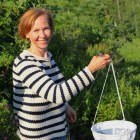Phytoplankton are at the base of the aquatic food web, and thus play an important role as food for higher trophic levels, in carbon and oxygen cycling, and in the cycling of nutrients. However, phytoplankton can also be a nuisance or harmful to humans and other organisms when they become very abundant and/or produce algal toxins. Different species and even different populations within a species may have diverging traits and behavior. We also know that phytoplankton have a high genetic diversity. Currently we have a limited understanding of what this diversity means, how populations differentiate and eventually speciate, and their extent and frequency of dispersal. These, and related questions are what we address in the Rengefors lab at the Department of Biology, Lund University, Sweden.

